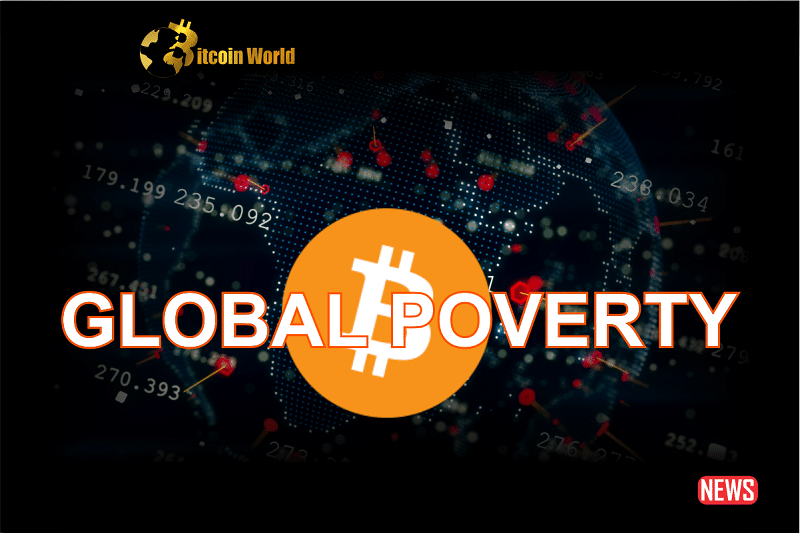In our increasingly digital world, could the original cryptocurrency, Bitcoin, be a game-changer in the fight against global poverty? It might sound like a bold claim, but let’s delve into how this decentralized technology is offering new avenues for financial inclusion and economic empowerment.
How Can Bitcoin Bridge the Financial Gap?
For billions worldwide, access to basic financial services remains a significant hurdle. Think about it:
- The World Bank estimates that 1.4 billion adults are unbanked.
- Without bank accounts, saving, borrowing, and investing become incredibly difficult.
- This lack of access directly hinders economic progress and perpetuates poverty.
Here’s where Bitcoin steps in. Its decentralized nature bypasses traditional banking systems, offering a potential solution for the unbanked. Imagine being able to:
- Create a secure digital wallet with just a smartphone and internet access.
- Send and receive money without needing a bank account.
- Participate in the digital economy without traditional financial gatekeepers.
This level of accessibility has the power to bring a significant portion of the global population into the formal economy, offering a pathway out of poverty.
The Remittance Revolution: Sending Money Home More Efficiently
Remittances – money sent home by individuals working abroad – are a lifeline for many families in developing nations. In 2022 alone, these flows were estimated at a staggering $626 billion, according to the World Bank. However, traditional money transfer methods often come with hefty fees and slow processing times.
While services like Wise have made strides in reducing costs and speeding up transfers, they often still require the recipient to have a bank account – a barrier for many. Bitcoin offers a compelling alternative:
- Lower Fees: By eliminating intermediaries, Bitcoin transactions can significantly reduce transfer costs.
- Faster Transfers: Bitcoin transactions are typically much faster than traditional bank transfers, sometimes taking just minutes.
- Direct Transfers: Funds can be sent directly to a recipient’s Bitcoin wallet, bypassing the need for a bank account.
This increased efficiency means more money reaches those who need it most, directly impacting poverty levels.
Opening Doors to Global Markets: How Bitcoin Empowers Businesses
Consider small businesses in developing countries. Engaging in international trade can be a powerful engine for growth, but it’s often hampered by complex regulations and high transaction costs associated with cross-border payments.
Bitcoin, being borderless and not subject to the regulations of any single nation, can level the playing field. It offers the potential to:
- Facilitate easier and cheaper international transactions.
- Open up new markets for businesses previously excluded due to financial barriers.
- Foster economic growth by enabling participation in the global economy.
This increased access to global markets can create new opportunities and contribute to poverty reduction.
Navigating the Challenges: Addressing the Risks of Bitcoin
While the potential benefits of Bitcoin in alleviating global poverty are undeniable, it’s crucial to acknowledge the associated challenges and risks. Let’s address some key concerns:
The Shadow of Illicit Activities
One major concern is the potential for Bitcoin to be used for illegal activities due to the pseudonymity it offers. While reports from Chainalysis indicate that the vast majority (99.76% in 2022) of crypto transactions are legitimate, the risk of misuse remains. This highlights the need for:
- Robust regulatory frameworks that can deter criminal activity without stifling innovation.
- Ongoing monitoring and analysis of Bitcoin transactions.
Protecting Vulnerable Users
Consumer protection is paramount, especially for individuals in vulnerable communities who may be less familiar with the complexities of Bitcoin. The risk of scams and fraud is a real concern. To mitigate this, we need:
- Comprehensive educational initiatives to empower users with the knowledge to use Bitcoin safely and responsibly.
- User-friendly platforms and resources that simplify Bitcoin usage.
The Price Rollercoaster: Volatility Concerns
Bitcoin’s price volatility is another significant challenge. While some see it as an investment opportunity, the inherent risk can be detrimental to those living in poverty. Imagine relying on Bitcoin for savings or remittances, only to see its value plummet. Strategies to manage this volatility include:
- Promoting the use of stablecoins, cryptocurrencies pegged to stable assets like the US dollar.
- Encouraging gradual adoption and diversification of financial resources.
Bitcoin: A Piece of the Puzzle, Not the Entire Solution
It’s important to remember that Bitcoin is not a magic bullet for eradicating global poverty. It’s a powerful tool that can be part of a broader strategy. To truly make a difference, Bitcoin’s potential needs to be complemented by:
- Investments in education and healthcare.
- Improvements in infrastructure.
- Sound socioeconomic policies.
Conclusion: Embracing the Potential, Mitigating the Risks
Bitcoin presents a compelling opportunity to empower individuals, enhance financial inclusion, and foster economic growth in developing nations. Its decentralized nature offers innovative solutions to long-standing challenges in remittances and access to global markets. However, realizing this potential requires careful management of the associated risks, including illicit use and price volatility. By prioritizing education, developing appropriate regulatory frameworks, and integrating Bitcoin into broader development strategies, we can harness its transformative power to make a tangible impact on global poverty. The journey is complex, but the potential rewards are immense.
Disclaimer: The information provided is not trading advice, Bitcoinworld.co.in holds no liability for any investments made based on the information provided on this page. We strongly recommend independent research and/or consultation with a qualified professional before making any investment decisions.


